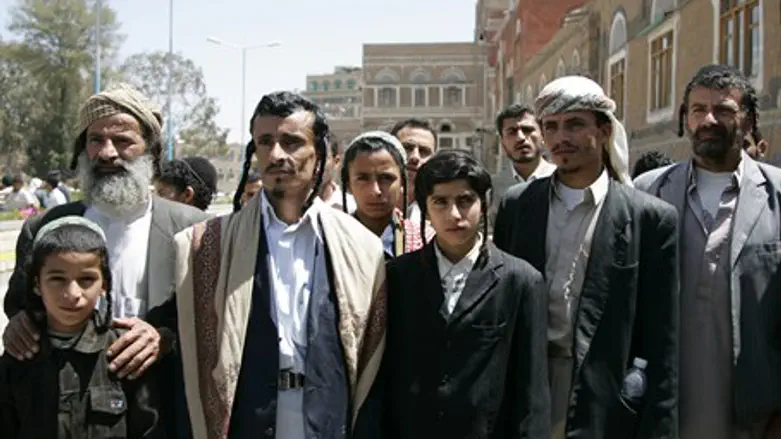
As Israelis and Jews throughout the world mark Holocaust Memorial Day - commemorating the Holocaust which ravaged European Jewry and drove many communities there to extinction - and vowing to never allow another atrocity like it to occur, another Jewish community is quietly, but surely, fading away due to anti-Semitism and political instability.
At the start of the twentieth century Yemen's Jewish community numbered approximately 60,000. But today, after centuries of anti-Semitism which peaked in the last century, the community stands at less than 90.
Most Yemeni Jews left the country in the twentieth century, during the region-wide campaign by Arab states to ethnically-cleanse their Jewish minorities, many of whose presence in those countries had predated the Arab conquest and the emergence of Islam by centuries.
In all, approximately one million Jews from Arab countries were either expelled or forced to flee due to anti-Semitic persecution. Many of them and their descendants currently reside in Israel, and account for more than half the Jewish population there.
But even the small number of Yemeni Jews who remain in the Middle East's poorest country are slowly disappearing.
On April 26, Sky News Arabic aired a program on the last Jews of Amran province in western Yemen. The program was translated by MEMRI (the Middle East Research Institute).
The report revealed how the province, once a thriving center of Jewish life, now consists of just three families.
The rapid decline of the community is blamed largely on Houthi rebels, a Shia Muslim separatist group fighting to secede from the Sunni-majority country. Interviewees explain how Houthi rebels have systematically scapegoated Jews in the region, both for religious reasons and due to the community's perceived loyalty towards Sana'a.
But Sunni Islamists linked to Al Qaeda have also been responsible for anti-Semitic attacks on Jews in the country, including the murders of Jewish schoolteacher Moshe Nahari in 2008, and of community leader Aaron Zindani in 2010. Both of their families subsequently fled to Israel.
One of the experts interviewed on the program predicted that "within a few years, nothing will remain of Yemen's Jewish community."
Indeed, by now that grim assessment is undisputed, but the question is why it has happened with so little media attention.
According to Jewish rights activist Lyn Julius, the relative silence of the Jewish leadership regarding the plight of Yemeni Jewry was necessary in order to avoid attracting even more hostile attention towards them - particularly as most have chosen to leave for Israel.
"The demise of this 3,000-year-old community is very sad," said Julius, who co-founded Harif, the Association of Jews from the Middle East and North Africa. "But I can understand why the leadership has been silent - the exodus of the last Jews of Yemen has required discretion."
"There is the sensitive issue of the 70 or so still in Sana'a. Hopefully they too will see they have no future and leave," she adds, sadly mindful of the highly dangerous situation in which they live.
State of siege
While most of the few Jews remaining in Yemen at the turn of the century have fled the country altogether as a result of this toxic cocktail of violence and intimidation, some - including Yemen's Chief Rabbi - opted instead for the relative safety of the capital.
Yet that has been little better, as the dwindling number of Jews offered "protection" by the government there are forced to live in a state of virtual siege - and face the constant terrifying specter of eviction from their last outpost of relative security.
In a rare interview last year Rabbi Yahya Youssef Salem detailed the miserable conditions of Yemen's remaining Jews.
Rabbi Salem explained how even in Sana'a he was forced to cut off his peyot (sidecurls), traditionally grown long by Yemenite Jews, as a result of regular harassment by local Muslims.
"They took our homes, our land, our cars - they even took my historical library!" he lamented, referring to the Houthis.
And so, as this ancient Jewish community joins the tragic fate of so many others in the Middle East, soon all that will be left is yet another memorial day.
